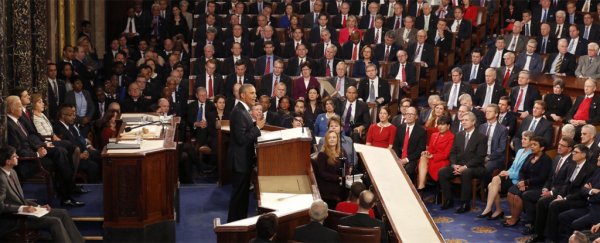In a powerful State of the Union address, his final as president of the United States, Barrack Obama has announced a new American initiative to cure cancer.
Referring to vice-president Joe Biden's comments last year, when Biden announced he would not be running for president in 2016 – in part due to the death of his son, Beau, from cancer – Obama introduced what could amount to be one of his most important scientific policies.
"[W]e can do so much more," he said. "Last year, vice-president Biden said that with a new moonshot, America can cure cancer. Last month, he worked with this Congress to give scientists at the National Institutes of Health the strongest resources they've had in over a decade."
After stopping for applause, Obama continued: "Tonight, I'm announcing a new national effort to get it done. And because he's gone to the mat for all of us, on so many issues over the past 40 years, I'm putting Joe [Biden] in charge of Mission Control. For the loved ones we've all lost, for the family we can still save, let's make America the country that cures cancer once and for all."
While Biden appeared to feign surprise at the president's comments during the address, in truth he was well aware of the initiative, immediately publishing a post on Medium giving further information on the ambitious plan, if little in the way of hard facts.
"From my own personal experience, I've learned that research and therapies are on the cusp of incredible breakthroughs. Just in the past four years, we've seen amazing advancements. And this is an inflection point," Biden writes. "And the goal of this initiative – this 'Moonshot' – is to seize this moment. To accelerate our efforts to progress towards a cure, and to unleash new discoveries and breakthroughs for other deadly diseases."
What will those discoveries be? While details of the policy are still thin, Biden says advancements in immunotherapy, genomics, and combination therapies could be revolutionary in the fight against cancer, but that the current medical system keeps information locked in silos, preventing help reaching patients most at need.
To turn things around, Biden has pledged to increase resources to fight cancer, both public and private, and to break down these silos "and bring all the cancer fighters together – to work together, share information, and end cancer as we know it," with the ultimate goal of doubling the current rate of progress in cancer research, making a decade worth of advances in the next five years.
To do so, Biden will be bringing together researchers, physicians, government bodies and corporations, to encourage greater collaboration between what he says are disparate groups. One such collective, announced alongside Obama and Biden's initiative, is a group calling itself Moonshot 2020, consisting of a coalition of pharmaceutical companies who aim to complete clinical trials for up to 20 tumour types in as many as 20,000 patients by the year 2020.
While it's definitely a worthwhile goal, unfortunately many drugs that enter clinical trials don't end up being successful treatments. It's also not really as simple as curing 'cancer', which is far more complex than one disease. Each different organ is plagued by a myriad of different tumour types, all of which behave in very different ways. Still, the more new compounds we test out, the better chance we have of finding something that works.
"This is our moonshot," says Biden. "I know that we can help solidify a genuine global commitment to end cancer as we know it today – and inspire a new generation of scientists to pursue new discoveries and the bounds of human endeavour."
